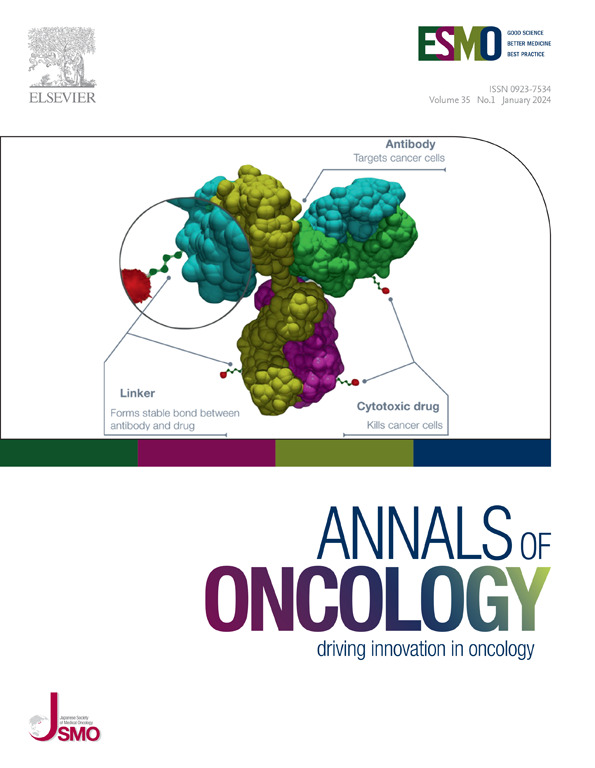ESMO精确肿瘤工作组关于临床实践中分子肿瘤板的结构和质量指标的建议。
IF 56.7
1区 医学
Q1 ONCOLOGY
引用次数: 0
摘要
背景:随着基因组图谱在临床实践中的应用的增加和诊断方式的不断复杂,需要对大量复杂的数据进行适当的解释并将其整合到个性化的护理计划中。为了应对这些挑战,分子肿瘤委员会(MTBs)已经广泛建立。到目前为止,还没有确定任何规范MTBs组成和工作流程的国际建议。方法:ESMO的精密肿瘤工作组(POWG)建立了一个精密肿瘤国际专家小组,并确定了核心兴趣领域。经过几次协商并通过专家协商一致意见程序,专家组就每项建议达成了协商一致意见。结果:该小组定义了MTB过程中对其功能和临床应用至关重要的五个组成部分:(i) MTB的主要任务是提供基因组知情的临床建议,特别是对于表现出复杂基因组改变的病例;(ii)为实现这一目标,MTBs应包含跨学科的专业知识,具有基因组专业知识的肿瘤学家、具有分子训练的病理学家和临床遗传学家应发挥关键作用;(iii) MTBs的建议应记录在一份结构化报告中,其中包括基因组知情的治疗策略、潜在肿瘤检测种系改变的管理计划和额外基因组检测的指导;(iv)应实施结构化的后续流程,以监测MTBs建议的临床有效性;(v)最后,专家组提出了运行MTBs的质量指标,包括病例讨论的周转时间以及成功实施可操作建议和临床试验登记的病例比例。结论:这些ESMO的POWG建议可以作为指导,并有助于确定mtb的质量标准,以实现协调,并进一步加快将精确肿瘤学整合到临床实践中。本文章由计算机程序翻译,如有差异,请以英文原文为准。
ESMO Precision Oncology Working Group recommendations on the structure and quality indicators for molecular tumour boards in clinical practice
Background
With an increased uptake of genomic profiling in clinical practice and the evolving complexity of diagnostic modalities, vast amounts of complex data need to be properly interpreted and integrated into an individualised care plan. To address these challenges, molecular tumour boards (MTBs) have been widely established. As of today, no international recommendations regulating the composition and workflows of MTBs have been defined.
Methods
ESMO’s Precision Oncology Working Group (POWG) established an international expert panel in precision oncology and defined core areas of interest. After several consultations and through an expert consensus process, the group reached a consensus level for each recommendation.
Results
The group defined five components in the MTB process that are critical to its function and clinical use: (i) the primary task of MTBs consists in providing genomic-informed clinical recommendations, particularly for cases exhibiting complex genomic alterations; (ii) to achieve this, MTBs should encompass interdisciplinary expertise, with key roles for oncologists with genomic expertise, pathologists with molecular training and clinical geneticists; (iii) MTBs’ recommendations should be documented in a structured report that includes genomic-informed treatment strategies, management plans for potential tumour-detected germline alterations and guidance for additional genomic testing; (iv) structured follow-up processes should be implemented for monitoring the clinical effectiveness of MTBs recommendations and (v) finally, the panel proposed quality indicators for operating MTBs, including turnaround times for cases discussion and the proportion of cases for which actionable recommendations and clinical trial enrolments were successfully implemented.
Conclusions
These ESMO’s POWG recommendations can serve as a guidance and help to define quality standards for MTBs to allow for harmonisation and to further expedite the integration of precision oncology into clinical practice.
求助全文
通过发布文献求助,成功后即可免费获取论文全文。
去求助
来源期刊

Annals of Oncology
医学-肿瘤学
CiteScore
63.90
自引率
1.00%
发文量
3712
审稿时长
2-3 weeks
期刊介绍:
Annals of Oncology, the official journal of the European Society for Medical Oncology and the Japanese Society of Medical Oncology, offers rapid and efficient peer-reviewed publications on innovative cancer treatments and translational research in oncology and precision medicine.
The journal primarily focuses on areas such as systemic anticancer therapy, with a specific emphasis on molecular targeted agents and new immune therapies. We also welcome randomized trials, including negative results, as well as top-level guidelines. Additionally, we encourage submissions in emerging fields that are crucial to personalized medicine, such as molecular pathology, bioinformatics, modern statistics, and biotechnologies. Manuscripts related to radiotherapy, surgery, and pediatrics will be considered if they demonstrate a clear interaction with any of the aforementioned fields or if they present groundbreaking findings.
Our international editorial board comprises renowned experts who are leaders in their respective fields. Through Annals of Oncology, we strive to provide the most effective communication on the dynamic and ever-evolving global oncology landscape.
 求助内容:
求助内容: 应助结果提醒方式:
应助结果提醒方式:


